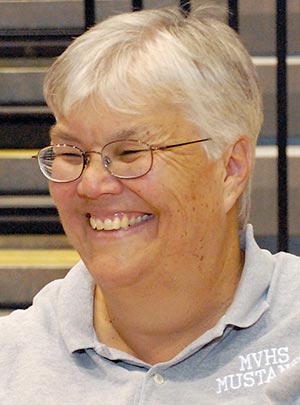Fair play
Gender equality still lacking in reservation sports
By Candace Begody
Navajo Times
WINDOW ROCK, Oct. 7, 2010

(Times photos - Paul Natonabah)
Lucinda Nash
And over a 40-year span, from her childhood in Red Mesa, Ariz., to student and then public figure in the community of Kayenta, Nash has not seen the change that is needed to end gender discrimination in sports.
"I remember a time when women had to use the same one-piece uniform for all sports they participated in," said Nash, who now coaches volleyball at Monument Valley. "The boys always got new uniforms for each sport."
Nash was one of several speakers at the 2010 Parental Involvement Conference at the Navajo Nation Museum last week. Her topic was "Women and Sports," and she addressed the value of sports to both sexes, problems with reservation sports, ways in which parents support their athletes, and whether or not women are treated fairly in the sporting arena.
The seven mothers in attendance at the conference reacted with visible interest when Nash posed the question, "Are women being treated fairly?"
She recalled being the only female high school athletic director at meetings of the Arizona Interscholastic Association.
"What really pisses me off is AIA's unwillingness to sanction a state wrestling tournament just for girls," said Nash, adding that it's a fight she does not intend to give up. "These days we have more girls than boys joining wrestling."
AIA officials did not return phone calls as of press time Wednesday.
Not only do female players get less consideration, female coaches are paid far less than their male counterparts, Nash said.
"Female coaches used to get paid $400 for a season," she said, "while the male coaches got $1,600. Is that fair?"
During basketball games, "boys get the prime (playing) time," she said.
The mothers nodded in agreement. This discrimination persists even though at many schools the girls' teams are outperforming the boys in competition.
"For us," Nash said of Monument Valley, "if you want to see our team win, you have to watch the girls' game."
While Native rights advocates decry team mascots that perpetuate stereotypes, Nash noted that no one seems bothered about the fact that so many high school mascots are depicted as distinctly male.
Referring to the Window Rock Scouts and the Tuba City Warriors, she said, "What do you see when you look at the mascots?"
"All I see is a man," one listener responded.
"I find it very offensive," Nash said.
So what do women do? Nash was asked.
"Women tend to endure and accept," she said. "They need to stand up."
Among the positives that parents addressed were rewards offered after competition, social etiquette, self-discipline, and staying physically fit.
"(Student athletes) need to be told they did a good job, they need to know how to behave if they lose," Nash said. "And without a sound mind and sound body, your child cannot be healthy."
Financial barriers, politics and the creation of a hierarchy within schools made up the negatives to joining sports.
"Shoes are expensive especially if they're all-around athletes," said Vicky Bryant of Sheep Springs, N.M., a parent of two. "Money for their travel gets to be too much sometimes."
Bryant said she confronted school officials after learning from her daughter that male athletes received $10 for meals while the girls only received $7.
The mixing of politics and sports on the reservation gets nasty, all women agreed.
"Yes! It gets downright dirty," Nash agreed, referring to parents who aim anger at the coaches if their child does get playing time during a game. "Coaches and the parents set the example during the games."
She admitted to having "lost it" herself at some games, but said she's "working on it."
The handful of mothers who attended the session said they left it enlightened.
"She got me thinking about things I had never thought about," said Nelda Huskie of Tuba City, noting the mascot issue. "I'd like to advocate more for the teams now."

